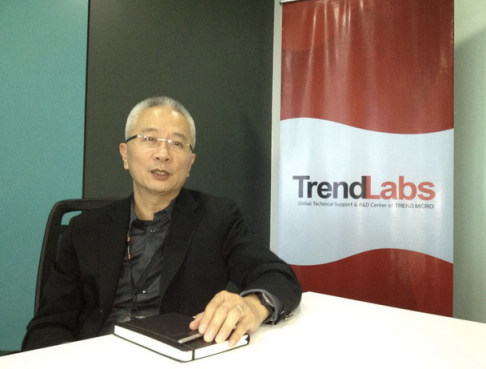The following article appeared in print in the Business Agenda section of Manila Bulletin and on the web here on the Manila Bulletin website on September 29, 2013.
Text and photo by Kris Lanot Lacaba
Trend Micro was founded in 1988 in Los Angeles by Steve Chang with his wife Jenny and sister-in-law Eva Chen. It later moved to Cupertino in Silicon Valley and became a public company when it opened at the Nikkei in Tokyo in 1998. Japan accounts for 40 percent of Trend Micro’s worldwide revenue, says Chang.
Trend Micro has offices around the globe, with Trend Labs in Philippines being its second biggest with 1,100 employees. The biggest office is in Taipei, with 1,200 employees. Trend Micro also has operations in countries such as China, Munich and Ireland.
“The Internet is a good highway for informational exchange. But it’s an open road, an open railway that can carry these viruses,” says Mitchel Chang, senior vice president at Trend Micro Inc. Chang heads Trend Micro’s technical support in the Philippines and the rest of the world.
These days, computer users need to do more than just scan their computers. Computer viruses and other threats now proliferate faster and new ones are always being created on an hourly basis. Computer viruses, phishing scams, spyware, worms, Trojans, botnets, rootkits, fake AV, and other cyber-threats are becoming more and more sophisticated.
Hack attacks can be carried out by individuals or by so-called cyber-armies, says Chang. These may be part of something referred to in the computer industry as APT, or advanced persistent threat. They theoretically could do so for the purpose of personal gain, corporate or government espionage, or plain vandalism.
One of the most insidious ways of getting your personal information is through phishing. “The idea is to trick you to initiate a silent attack,” says Chang. For example, you could be made to think you are opening a website or an e-mail message from a legitimate company when in fact you are being tricked to activate a malicious code. Or you could be asked to reveal sensitive personal information. “A lot of these attacks, they’re very silent. You don’t know when you’ve been hacked already…These are threats that are very difficult to detect,” he says.
“There is so much more technology today than 10 or 20 years ago,” says Chang. “To give you a perspective, when Trend Micro started, you get a new virus every month. [Today] on a daily, even hourly, basis, there are thousands of millions of viruses coming out,” he says.
Who Should Be Protected?
What’s the worst-case scenario for someone who doesn’t protect his or her computer? Perhaps it’s not being able to operate the computer. But what about personal data or company data? A computer can be replaced, but can the data be recovered once it is lost? And there is also the danger that malicious computer code is stealing information. The login to your bank account, for instance, could be stolen.
“I think everybody should be protected from cyber-threats,” says Mitchel Chang. Indeed, Trend Micro’s customer base is very broad and includes individual customers, small and large corporations, and various government agencies. In the Philippines, Trend Micro has a presence in most industries, with corporate clients making up the majority of their accounts.
With corporate clients, Trend Micro works closely with the information technology or chief security officer. Corporate networks work with an array of servers, gateways, and firewalls. “Protection for them is different,” says Chang. “It’s not just the desktop machine (called endpoint)…Our primary business is providing content security,” he explains. For those clients, Trend Micro provides specifically designed scanning tools that also scan e-mails running Microsoft Exchange. The company also has different scanning tools for different gateways.
Aside from having products for individual and corporate clients, Trend Micro also has products that aim to protect kids who go online. “We believe people should enjoy their digital life,” says Chang, adding, “They should be able to surf or use their mobile devices without being hacked. And we want to make it as transparent for the users. They should be able to install our product and have that peace of mind. For the consumer we have a ‘premium service’; if you have questions, we have special agents that can help the consumer.”
Moving To The Cloud
Trend Micro has products to address malware for Apple Macs and Windows PCs. For years, these were sold as DVD installers and updates came out once a year.
According to Mitchel Chang, the trend in the last four to five years is for companies to start moving to the cloud. “Now there is a huge shift with our product,” Chang says. They are “not just physically protecting your machine…we don’t just protect your computer or your stuff on premise; we’re also protecting your data in the cloud.”
Technology is moving at a lightning fast rate. That means while new products are coming out, new threats are also being created. “In order to catch new malware, we have to upgrade our technology. Update our definition of virus pattern files. Using our software not only gives you the ability to run that software on your machine. You are getting the ability to ping our servers and get downloads. If there’s a new virus, we can immediately push out the virus prevention tool in real time,” Chang says. Also, Trend Micro’s latest products now include software that aims to make even mobile devices safer to use.
Ends Chang, “We have a product called Deep Security. Cloud is big. We don’t just protect your computer. The product doesn’t just protect your stuff on premise, we’re also protecting your data in the cloud. We’re catching the wave. We’re the leader in cloud security today.”
